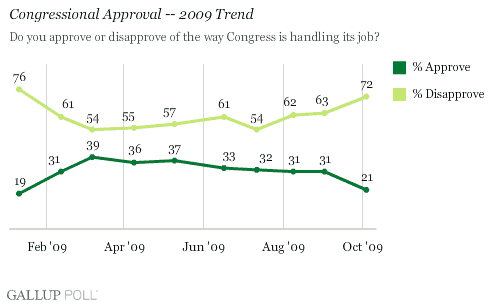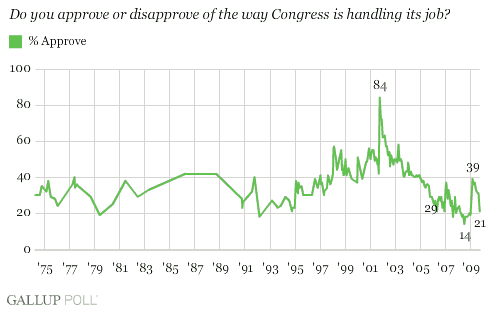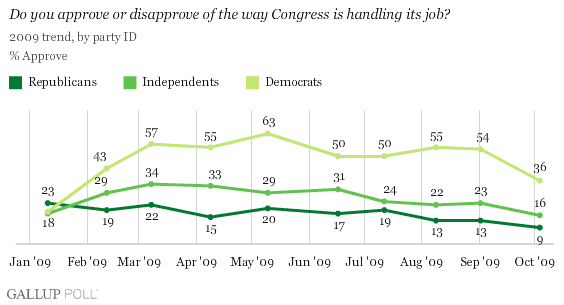PRINCETON, NJ -- Americans' approval of the job Congress is doing is at 21% this month, down significantly from last month's 31% and from the recent high of 39% in March.

"The current drop in overall job approval to 21% particularly reflects a substantial drop in approval among Democrats, whose 36% rating this month is 18 points lower than last month's 54%, and the lowest since January of this year."
Congressional approval rose sharply in the months after President Obama's inauguration, from 19% in January to 31% in February and 39% in March. Approval then began to slip gradually, dipping to 31% by the end of the summer, before falling precipitously in October. Given the current 21% reading, it appears that any "honeymoon" period for the 111th Congress has eroded.
Approval of Congress today is significantly below the average 36% rating found across the past two decades.

Congressional job approval reached its all-time high of 84% in October 2001, weeks after that year's Sept. 11 terrorist attacks, and at a time when presidential job approval also shot to all-time highs. Approval of Congress slowly declined from that point through the summer of 2008, reaching the all-time low of 14% in July of that year, as gas prices soared to record highs.
The current drop in overall job approval to 21% particularly reflects a substantial drop in approval among Democrats, whose 36% rating this month is 18 points lower than last month's 54%, and the lowest since January of this year.

Republicans' already-low ratings of Congress have dropped marginally, to 9% from 13% last month. There is a similar pattern among independents, whose approval of Congress, now at 16%, is down from 23% last month.
Bottom Line
The reasons why Americans' ratings of Congress have fallen so significantly this month are not completely clear. The highly publicized and sometimes acrimonious debate over healthcare reform in recent weeks would seem a proximate and, therefore, possible explanation. It is also possible that Americans are frustrated with the lack of meaningful outcomes from Congress. A Gallup analysis of a drop in congressional job approval ratings in 2007 found that many who disapproved cited congressional inaction as the explanation.
Of note is the steep decline in approval among Democrats, who appear to be souring on the job Congress is doing despite the fact that their party controls both the House and the Senate. For the first time since February, Democrats' approval of the job Congress is doing is below 50% -- with only slightly more than a third of Democrats now approving. It is possible that after watching Democratic lawmakers defend healthcare reform in town hall meetings through the summer, rank-and-file Democrats may be disappointed that Congress hasn't followed through with more progress on that legislation this fall.
Congress remains the lowest rated of the three branches of government. Gallup Daily tracking puts President Obama's job approval ratings in the low 50% range in recent days, and Gallup's most recent assessment of the Supreme Court in late August/early September gave that institution a 61% job approval score.
Survey Methods
Results are based on telephone interviews with 1,013 national adults, aged 18 and older, conducted Oct. 1-4, 2009. For results based on the total sample of national adults, one can say with 95% confidence that the maximum margin of sampling error is ±4 percentage points.
Interviews are conducted with respondents on land-line telephones (for respondents with a land-line telephone) and cellular phones (for respondents who are cell-phone only).
In addition to sampling error, question wording and practical difficulties in conducting surveys can introduce error or bias into the findings of public opinion polls.
